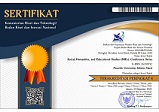Penggunaan Model Pembelajaran Problem Based Learning untuk Meningkatkan Hasil Belajar Matematika Siswa
Abstract
This research was conducted to address the low Mathematics learning outcomes of fourth- grade students, attributed to the lack of innovative instructional media and the limited connection between learning materials and real-life contexts. The Problem Based Learning (PBL) instructional model was implemented in two cycles involving 13 fourth-grade students, consisting of 6 males and 7 females. Each cycle included planning, implementation, observation, and reflection. The data analysis results revealed a significant improvement in students' mathematics learning outcomes. In the pre-cycle, the average score was 58.8, with a learning completeness of 31%, categorized as low. Cycle I showed an improvement with an average score of 65 and a learning completeness of 54%, categorized as sufficient. In Cycle II, the results reached an average score of 72.3 and a learning completeness of 77%, categorized as high, meeting the success indicator criteria of the study. Thus, it can be concluded that the application of the PBL model is effective in enhancing Mathematics learning outcomes for fourth-grade students.
Keywords
Full Text:
PDFRefbacks
- There are currently no refbacks.





